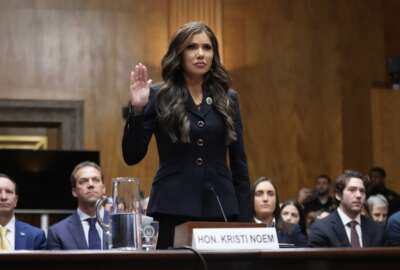Nation’s first-ever CISO lays out strategy priorities
In today's Top Federal Headlines, Gregory Touhill, the nation's first U.S. Chief Information Security Officer lays out what his office will be focusing on.
The Federal Headlines is a daily compilation of the stories you hear discussed on Federal Drive with Tom Temin.
- The first-ever U.S. Chief Information Security Officer has revealed his list of priorities for the nation’s cybersecurity. Gregory Touhill said his office will focus on five lines of effort: educating the workforce, better classification of protected information, practicing good cyber hygiene, staying a step ahead of hackers, and making sure management has up to date information. (CIO.gov)
- A bill passed by the House would give Congress the ability to check regulations issued by outgoing presidents — so-called “Midnight Rules.” Rep. Darrell Issa’s (R-Calif.) Midnight Rule Relief Act gives Congress the chance to disapprove regulations federal agencies submit within the last 60 days of a session during the final year of a president’s term. If passed by the Senate, it would probably be vetoed. (Rep. Darrell Issa)
- Speaking of potential midnight rules, the Federal Acquisition Regulation Council has finalized a rule to require bidders of federal contracts to let agencies know whether they publicly disclose their greenhouse gas emissions and reduction goals. The rule only applies to offerors who received $7.5 million or more doing business with the government the previous year. (Federal Register)
- A court order has forced White House action on a controversial executive order. The Office of Federal Procurement Policy and the Labor Department are suspending the implementation of the fair pay and workplace safety executive order. OFPP, Labor and the Federal Acquisition Regulations Council issued a memo to agency chief acquisition officers late last month telling them not to implement the order’s provisions. The memo details three steps agencies should take. These include ensuring no provisions are included in new solicitations, removing clauses related to the order in any current RFP and educating contracting officers about the delay in implementation. (Department of Labor)
- House Republicans say they’re planning for an extended continuing resolution until March of next year. Defense Department Comptroller Mike McCord said that’s similar to what he’s hearing. That would create several challenges for DoD. McCord said the department’s operating budget will be underfunded, but he’ll have procurement dollars that he can’t spend. DoD is also working on budget review for fiscal 2018. McCord says 2018 could get messy when the Budget Control Act caps return. (Federal News Radio)
- The Defense Information Systems Agency wants to hurry one of its much-awaited contracts. DISA is working on moving its unified capabilities contract award from fourth quarter 2018 to first quarter. The contract would provide collaborative video, voice and data services for the Defense Department and military services. It could take six months to a year after the contract is awarded before customers see the service in action. (Federal News Radio)
- The inspectors general community wants more cooperation from industry. The IGs of three large federal agencies advise the procurement industry to make documents and individuals available during audits. They say it will help speed up oversight reports and avoid additional investigations into areas where companies might not want auditors to go. (Federal News Radio)
- We don’t know who will become the next Health and Human Services secretary, but the job will come with issues. The HHS inspector general laid out the top 10 management challenges. Topping the list, ensuring program integrity for Medicare Parts A and B. They’re big spend items and rising fast. Running Medicaid, including improper payments , is number two. It’s the biggest federal benefits program. Food and drug safety and the health insurance exchanges also make the list. (Department of Health and Human Services Office of Inspector General)
- The nation’s top intelligence officer has said the U.S. decision to publicly name Russia as the culprit behind election-related hacking had an effect. James Clapper, the Director of National Intelligence, told the House Intelligence Committee that Russia curtailed its cyber espionage activities almost immediately after an intelligence community estimate officially accused that nation of trying to interfere with the presidential election. But, he warned lawmakers there’s no reason to believe the Russian government will stop its information warfare campaign altogether. It was likely one of Clapper’s last appearances on Capitol Hill. He opened his testimony by saying that he has already submitted his resignation, and plans to step down on Inauguration Day. (WTOP)
Copyright © 2025 Federal News Network. All rights reserved. This website is not intended for users located within the European Economic Area.
Eric White
Eric White is news anchor and Federal Drive producer at Federal News Network.
Follow @FEDERALNEWSCAST
Related Stories
Related Topics






